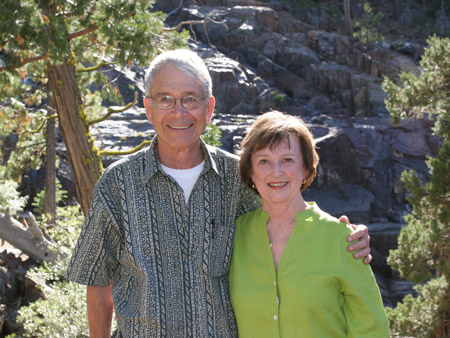
Summer 2016 ForestLife
Heritage & Pioneers
“Pacific Forest Trust is an innovative leader, bringing about compatibility between conservation and business interests.”
– Harry Turner
 Harry and Charlotte Turner have deep roots in California and they are passionate about helping conserve the state’s natural heritage and richness, which they see as essential for its future. They share Pacific Forest Trust’s vision of a practical, robust conservation economy that sustains private lands stewardship.
Harry and Charlotte Turner have deep roots in California and they are passionate about helping conserve the state’s natural heritage and richness, which they see as essential for its future. They share Pacific Forest Trust’s vision of a practical, robust conservation economy that sustains private lands stewardship.
How did your roots influence your feelings about forest conservation?
Harry: I was raised in Los Angeles, San Joaquin, and San Diego, which are very arid regions. In San Joaquin, I was very aware of water shortages due to drought and dryness. That’s when I knew life would not be possible without access to water. Today, Sacramento-south seems to be living and dying on the health of the north state’s forested watersheds.
Charlotte: I grew up in Yreka, California, when lumber was a big part of the economy for Siskiyou County. I knew many people who drove logging trucks for the local sawmill. Looking back, I miss the freedom and opportunities I had to climb trees, hike, go horseback riding, and explore. They are treasured memories for me. I think my rural upbringing helped me connect with PFT’s mission to preserve the beauty and tranquility I had at my doorstep.
What do you think are some of the greatest challenges for conservation in the coming years?
Charlotte: When I toured the Harts’ Butte Creek Meadows property last year, I could see the passion that Blair, Susan, and their whole family had for the work that they do to conserve their land. One of the biggest challenges I see is identifying and helping people understand how they can contribute to the well-being of the state, like the Harts have. Northern California is so important for our water resources. We need to share the successes of landowners to encourage others to conserve their lands as well.
Harry: Looking to the next decades, the greatest challenge arises from global warming—access to water for drinking and agriculture locally, regionally, and globally. We live in an arid state that supports nearly 40 million people, and water is increasingly difficult and expensive to access. From my experience, I’d like the leaders in our state to use another tool—investing money in watersheds as a cost effective way to help us all for the long run.
How did you first learn about PFT?
We learned about PFT through our daughter, Kaarsten. She’s now the Vice President of Ecological Services for The Forestland Group in North Carolina and has been involved in developing their carbon offset projects for California’s carbon market. The Forest Land Group was a sponsor of PFT’s annual fundraiser, Forest Fete, and Kaarsten brought us to one of PFT’s other events. She first learned about PFT some 20 years ago and has really followed the ecosystem services markets and working lands conservation work PFT has done.
What do you find compelling about PFT’s work and its impacts?
“What appeals to me is the organization, efficiency, and passion PFT demonstrates to meet its goals.”
– Charlotte Turner
Harry: What’s compelling to me is the execution of PFT’s mission through the integration of their education, policy, and advocacy programs, and their direct interactions with private landowners. As an investor and taxpayer, I really like how PFT uses structured vehicles like Working Forest Conservation Easements because they are financially efficient for the landowners and the public.
